

Atrocity Alert No. 241: Ethiopia, South Sudan and Yemen
Atrocity Alert is a weekly publication by the Global Centre for the Responsibility to Protect highlighting situations where populations are at risk of, or are enduring, mass atrocity crimes.
Aksum Church massacre and attacks on cultural heritage in Ethiopia
A deacon of the St. Mary of Zion church in the town of Aksum, northern Tigray region, reported to the Associated Press that approximately 800 people were killed near the church around 28 November. St. Mary of Zion is especially holy to adherents of the Ethiopian Orthodox Tewahedo Church as it is supposed to contain the Ark of the Covenant.
The deacon attributed the killings to Eritrean armed forces operating in Tigray. Soldiers reportedly forced their way into the church, dragged out worshippers and shot at those who tried to flee. The deacon said that “we could hear gunfire all over” and that bodies were scattered around Aksum. Although reports of the massacre were previously shared on social media, the ongoing communications blackout in Tigray had inhibited verification.
Both the Ethiopian and Eritrean governments deny Eritrea’s involvement in the ongoing Tigray conflict, despite the fact that reports of rape, killings, looting and other abuses perpetrated by Eritrean forces continue to surface.
The massacre in Aksum is among a number of recent attacks on or around Tigray’s ancient cultural and religious heritage. The town of Aksum is a UNESCO World Heritage site with ancient ruins of global significance. Other locations in Tigray that have been reportedly targeted and damaged during the armed conflict include the al-Nejashi mosque, one of the oldest mosques in Africa, and the Debre Damo monastery, home to ancient manuscripts and the oldest original-style church in Ethiopia, dating back to the sixth century. The deliberate destruction of protected cultural heritage is a war crime under international law.
The ongoing conflict in Tigray has also resulted in the ethnic targeting of Tigrayans both inside and outside Ethiopia. On 22 February a group of 15 ethnic Tigrayan soldiers due to return from serving with the UN peacekeeping mission in South Sudan requested asylum in Juba, fearing that they would be persecuted upon their return to Ethiopia.
Meanwhile, widespread civilian displacement and ongoing fighting in rural areas of Tigray leaves the population at risk of further atrocities. With 4.5 million people in need of emergency food assistance, the latest situation report by the UN Office for the Coordination of Humanitarian Affairs described the response to the crisis in Tigray as “drastically inadequate compared to the sheer magnitude of needs across the region.”
All attacks on civilians and cultural heritage in Ethiopia must be independently investigated and the perpetrators held accountable, regardless of rank or affiliation. Parties to the conflict must facilitate humanitarian access to all areas of Tigray and uphold its responsibility to protect all its populations, regardless of ethnicity.
UN warns of ‘massive escalation in violence’ in South Sudan despite peace deal
On 19 February the UN Commission on Human Rights in South Sudan (CHRSS) released a new report documenting an alarming increase in localized violence. According to the report, “vast swathes of South Sudan have witnessed a massive escalation in violence perpetrated by organized tribal militias.” During 2020 more than 2,000 civilians were killed in local conflicts, which were being “weaponized and turbocharged by external actors acting in their own economic or political interests,” according to David Shearer, Head of the UN Mission in South Sudan. The CHRSS claimed the level of localized violence may actually be higher than during the country’s civil war, which began in December 2013.
Monday, 22 February, also marked one year since the establishment of the Transitional Government of National Unity in South Sudan. While this was a major breakthrough in the peace process, reuniting long-term rivals President Salva Kiir and Vice President Riek Machar, the transitional government has been unable to address the underlying causes of inter-ethnic conflict, including competition over power and resources. Delays in establishing state boundaries and appointing governors has created a leadership vacuum, which is being exploited to manipulate long-standing enmities between rival ethnic communities.
Meanwhile, the government has made no real progress in establishing the transitional justice mechanisms set out in the 2018 Revitalized Agreement on the Resolution of the Conflict in the Republic of South Sudan, which formally ended the civil war. Although President Kiir approved the establishment of the Hybrid Court for South Sudan on 29 January, there has been no substantive attempt to hold perpetrators of atrocities committed during the civil war accountable for their actions.
During the 46th session of the UN Human Rights Council (HRC), which started on 22 February, members will have the opportunity to renew the mandate of the CHRSS, including the collection and preservation of evidence of and clarifying responsibility for alleged gross violations and abuses of human rights. The Commission has already compiled 101 dossiers of evidence on alleged perpetrators. The HRC should enable the Commission to continue its work until an appropriate court or tribunal is fully operational.
Yemeni displacement camps under attack as Marib offensive intensifies
Civilians in northern Yemen are facing a grave threat to their safety as Houthi forces intensify their military offensive in Marib governorate, the last northern stronghold of the government of President Abd-Rabbu Mansur Hadi. Since the offensive was launched in early February, the frontlines in Marib have moved perilously close to civilian areas. There are reports that several displacement camps in eastern Sirwah are already under attack and that missiles have also hit Marib city, forcing thousands of civilians to flee.
In response, the Saudi Arabia/United Arab Emirates (UAE)-led military coalition has carried out more than 100 airstrikes since 10 February to support pro-Hadi forces battling the Houthis. One military source described the ongoing fighting to Reuters as “a blood bath,” with high casualties suffered by both sides.
Condemning the Marib offensive, Mark Lowcock, UN Under-Secretary-General for Humanitarian Affairs, warned that, “an assault on the city would put two million civilians at risk, with hundreds of thousands potentially forced to flee – with unimaginable humanitarian consequences. Now is the time to de-escalate, not to add even more to the misery of the Yemeni people.”
According to the UN there are 140 displacement camps in and around Marib governorate that are providing shelter to at least 800,000 people. The Marib offensive has exacerbated the already dire situation in the camps, where many displaced civilians are without water, electricity and health services.
Responding to the latest developments, Jahaan Pittalwala, Research Analyst at the Global Centre for the Responsibility to Protect, said that, “it is clear that the conflict in Yemen cannot be resolved through a military victory. All parties to the conflict should commit to an immediate ceasefire and a negotiated political settlement facilitated by UN Special Envoy for Yemen, Martin Griffiths.” The UN Security Council should call for an immediate cessation of the Marib offensive and for accountability for all violations of international law committed by all parties to the conflict.
Related Content


